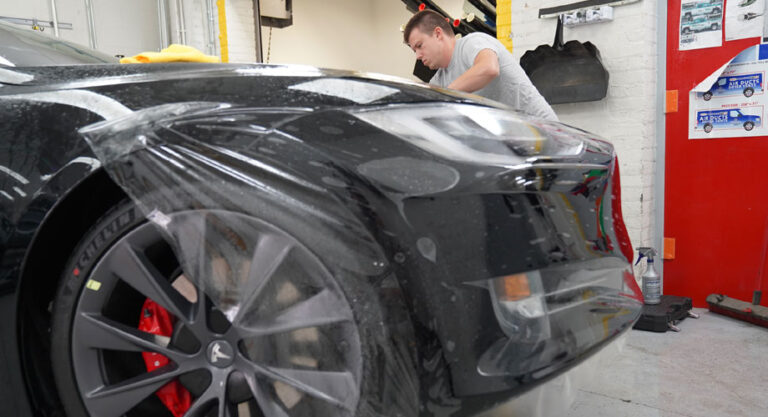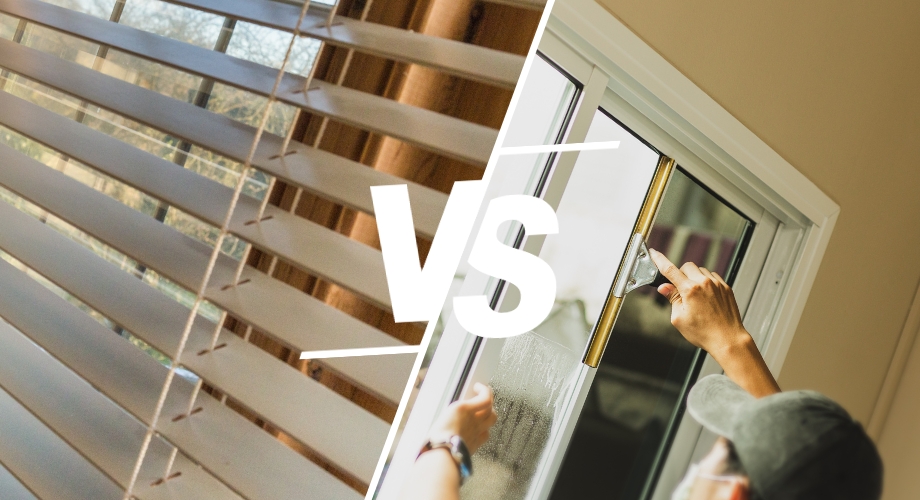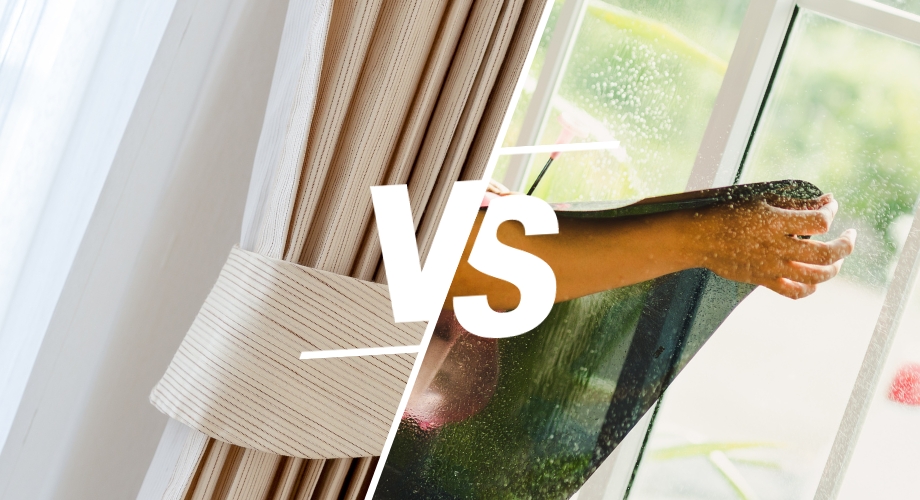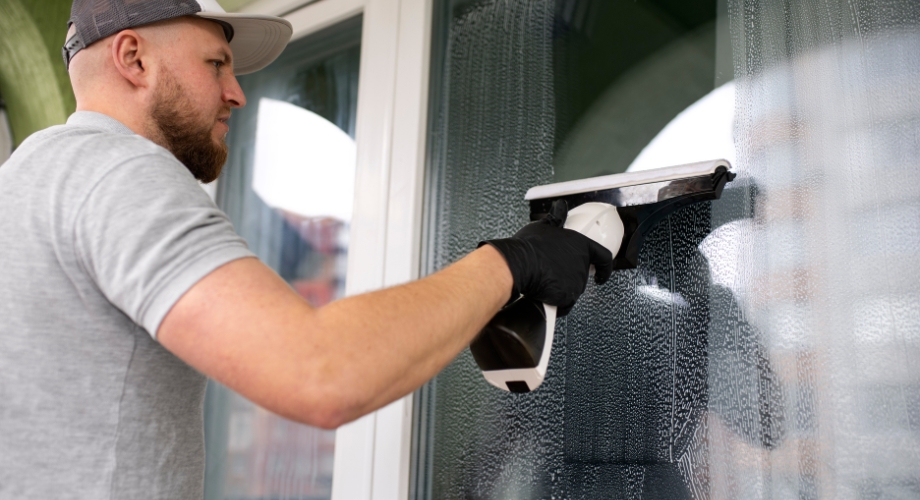





















































































































































































































Big or panoramic windows are one of the modern trends in architectural design. They are a source of natural light, which is necessary for productivity and the general well-being of people. However, in extreme heat, such windows allow additional heat in and allow UV rays to fade your interior. Furthermore, you must be ready for the lack of privacy and considerable heat losses during the cold season. Are there ways to mitigate these shortcomings? You can find endless solutions on the market today – curtains, blinds, shutters and window films. An average consumer can hardly know all the nuances of these options. So keep reading to find out the pros and cons of the most popular window protection means.

What are blackout curtains?
These are fabric drapes or shades that are used to cover windows to block out the light. They usually come with a lining or back made from tightly woven fabric. Blackout curtains can become a lifesaver for bedrooms as they effectively block up to 99% of light, providing ultimate privacy and blocking UV radiation. They also successfully reduce street noise, acting as a sound insulator. Besides, heavy curtains will reduce your energy costs – they can stop the loss of thermal energy to nearly 25-30%.
Speaking about the drawbacks of blackout curtains, there are a few things to know before making an investment. Light-blocking fabric is relatively expensive, so be ready to pay much more than traditional curtains. This type of window protection requires regular care as curtains accumulate dust. The biggest disadvantage is that they do not protect themselves from UV damage even if they stop UV rays from entering the room. Blackout curtains fade over time and need replacement.
How do window blinds work?
Blinds differ from traditional curtains as they are made from hard materials. Usually, it is plastic, but wood, bamboo, fabric and aluminum can be used as well. They look like straps that come horizontally or vertically and can fully or partially cover the window. Blinds diminish sunlight and provide privacy. One of the benefits of this solution is that blinds are available in endless colors, styles and textures.
However, blinds have a serious shortcoming – they do not shield from solar heat. They also cannot block harmful UV rays or protect from fading. Blinds can be misleading since they reduce the visible sunlight within a room, yet they actually absorb and emit solar heat from the glass, releasing it into the room. As a result, your electric bills grow because of heat gain and energy wastage.
What to expect from window films?
You may also consider a totally different method of sun and heat protection – window film or window tinting. It is made of polyester or PET (polyethylene terephthalate). The film is applied to the outer or inner window surface to increase its performance or enhance its appearance. This window treatment brings a lot of advantages. It’s estimated that in an uninsulated house, approximately 35% of heat escapes through walls, while 25% exits through the roof. And the remaining 40% dissipates through doors, windows, and the flooring. Window film can potentially boost the efficiency of the windows by as much as 25%. Besides, window films have other properties – they block UV rays, minimize solar heat influx and glare, while preserving the visual appeal of your windows. Furthermore, apart from safeguarding your home from external energy influences, window film also saves the energy produced by your heating and air conditioning systems.
You should bear in mind that despite many positive qualities, window films cannot guarantee complete privacy. It is possible to use frosted designs or mirror films to reduce visibility, but this approach will work in the daytime only.
our latest news!
Top reasons why window film is the best choice
If you have always had curtains and doubt whether a window film is a decent choice, here are a few arguments proving this can be a worthy replacement.
- Easier maintenance. Cleaning curtains often become a hassle, especially in households with children or pets. Moreover, curtains may just not be suitable for specific areas like the kitchen or dining room, as they absorb odors. Alternatively, window films are a breeze to clean— a simple wipe-down does the job. They do not retain odors or affect the air circulation inside. It is a perfect choice if you’re seeking a low-maintenance and easily cleanable window covering.
- Strong protection. Window film blocks all incoming light, filters out 99% of UV rays, and reduces the sun’s heat by up to 80%. Thus, it is a perfect solution for spaces exposed to direct sunlight. Window films do not only protect furniture from fading but also cool down the room. Besides, this treatment reinforces glass, protecting it from burglaries and breaking it into sharp pieces in accidents.
- Ergonomic design. Sometimes, heavy curtains can occupy more space than you can spare. If this is your case, consider using a window film. You can tailor the fit, style, and coverage level to match particular dimensions without stealing additional space. These features make window films ideal for apartments, smaller residences, bathrooms and kitchens.
- Better value. High-quality curtains and blinds are always associated with high costs and additional accessories, while window films provide a more cost-effective solution. Usually, they are budget-friendly, making it more affordable to replace them whenever you need. Besides, you save money on cleaning, as in the case of curtains, it may be daunting and costly.
Does window tinting provide privacy?
Some window films are flexible, and you can choose the level of Visual Light Transmission (VLT) that suits your preferences. The minimal VLT is 35%, which offers a minimal level of privacy while still allowing shapes of objects to be discernible, to VLT 15%, considered medium privacy, or even as low as 5%, rendering you nearly invisible from the outside. But it works in the daytime only. At night, widow films are see-through, so it is recommended to combine them with curtains or blinds.
Does window film cool a room?
The window film cannot cool a room, but it blocks the temperature loss inside the premises. It means that this covering will reduce your energy bills for the air conditioner in summer and preserve heat in the house during the cold seasons.
Can blackout blinds crack windows?
Modern blinds usually do not cause any harm to the window. However, improper installation can have negative consequences, especially if you try to fix blinds on the old PVC window frames. So make sure to weigh all the pros and cons when opting for a solution to protect your windows, as any crack on your window is the last thing you want.
Are blackout blinds or curtains better?
Blackout blinds offer adjustable control of the sunlight, while blackout curtains completely block it. So, it fully depends on your preferences which variant is more appropriate for you. For bedrooms, blackout curtains will be a winning choice, while for other premises, blinds are enough.
Is window tinting better than blinds?
Blinds may contribute to your privacy and prevent the light from coming inside. Yet, they do not cope well with solar heat and cannot block ultraviolet rays. Thus, window films can protect your home much better, providing not only light control and energy efficiency but also serving as a shield from fading.
How does window tint reduce more heat than blinds?
When you use blinds, the heat keeps coming through the window and accumulates in the gap between the window and the blinds. In other words, heat still gets inside the premises, while window films fully reflect it before it enters the house.
What to take into account when installing window tints?
First, take time to understand why you need window tints. Do you want to reduce sunlight, add more privacy, or just protect your interior from fading? The response to this question will help you choose the right product. Additionally, this information may further simplify your choice.
Types of window tints. There are different films on the market. Each of them offers unique benefits. Reflective tints are great for privacy and heat reduction. Ceramic tints offer excellent heat and UV blocking. Decorative tints in various patterns and frosted finishes are ideal for aesthetic appeal.
Energy efficiency. Films with high solar heat rejection are appropriate for hot climates. They keep your home cooler and reduce the need for AC. On the contrary, if you want to keep your home warmer, you can consider a film that allows some solar heat in during winter.
Light control and aesthetics. Darker tints may look very stylish but do not forget that they will steal some light. If you prefer a well-lit space, choose lighter tints. There is no optimal shade—it depends on your preferences. Reflective tints can add a modern touch, but they can impact the overall look of your home.
Budget and warranty. Window film prices depend on material and quality. Determine your budget in advance. Warranties protect your investment, so check whether fading and peeling issues are covered. Longer warranties often indicate higher-quality film.
Wrapping up
There is no universal solution for everyone. Some make the emphasis on practicality, while others evaluate the degree of benefit. Each of the above-described options has its features, so the final choice is in the hands of the consumer. Blackout curtains and blinds will fully cope with the task if you aim to achieve complete privacy in your space. However, if you are also looking for solutions such as heat rejection, UV protection and reduced energy expenses, consider window films. In this case, you will no longer need to choose between natural light and sun shields. Those who are looking for a major win can combine blackout curtains or blinds with window film. This way, you will enjoy the decorative and privacy benefits of traditional window covering and powerful energy-saving and anti-glare effects.




























 Send a message
Send a message Send a message
Send a message
